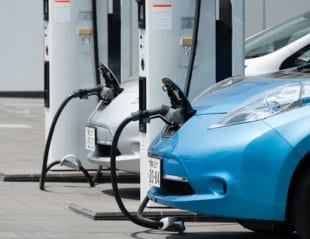The number of electric vehicles on roads around the globe nearly doubled in 2014-15 to well above one million, new analysis has revealed, with China alone adding more than 200,000 to its fleet for the year.

A report from the Centre for Solar Energy and Hydrogen Research Baden-Württemberg, published on Friday, shows that the number of electrically powered cars increased worldwide by almost 750,000 to around 1.3 million over the 12 month period.
In its latest assessment of developments in electric mobility, ZSW researchers recorded around 550,000 new registrations in 2015, up 68 per cent from the previous year when 330,000 new EVs were sold.
The research follows last week’s report from Bloomberg New Energy Finance, which predicted that sales of electric vehicles would hit 41 million by 2040, representing 35 per cent of new light duty vehicle sales – almost 90 times the number for 2015.
The BNEF research estimated that the growth of EVs – driven by further big reductions in battery prices – would see them represent a quarter of the cars on the road by 2040, displacing 13 million barrels of crude oil a day, and using 1,900TWh of electricity, equivalent to nearly 8 per cent of global electricity demand in 2015.
The BNEF study’s calculations on total cost of ownership show BEVs becoming cheaper on an unsubsidised basis than internal combustion engine cars by the mid-2020s, even if the latter continue to improve their average mileage per gallon by 3.5 per cent a year.
The research assumes that a BEV with a 60kWh battery will travel 200 miles between charges. The first generation of these long-range, mid-priced BEVs is set to hit the market in the next 18 months with the launch of the Chevy Bolt and Tesla Model 3.
“In the next few years, the total-cost-of-ownership advantage will continue to lie with conventional cars, and we therefore do not expect EVs to exceed 5 per cent of light duty vehicle sales in most markets – except where subsidies make up the difference. However, that cost comparison is set to change radically in the 2020s,” said BNEF senior analyst and author of the study, Salim Morsy.
For now, however, the ZSW report finds the US has the world’s biggest EV fleet overall, with a total of 410,000 registered; although Norway retains the title for the greatest EV percentage share of all cars nationwide – around 3 per cent of some 2.64 million cars.
China’s fleet of EVs, meanwhile, tripled in number to 307,000, while a Chinese EV manufacturer earned a spot among the market leaders for the first time in 2015, with 31,900 BYD Qin sold.
Otherwise, Tesla’s Model S took the top spot among new EV registrations in 2015, with 42,730 vehicles sold in the year. The US car maker’s prestige offering edged out two Japanese models, the Mitsubishi Outlander (41,080) and the Nissan Leaf (40,270) in the annual rankings, the report said.
2015 was also the first year that a German-made electric vehicle model appeared on the list of all-time best-selling EVs, with a total of 36,550 BMWi3s now on the road. The Nissan Leaf heads up this list with 193,260 sold since 2010.
The report also found that while EV customers in countries like China, Japan and France bought predominantly domestic models, this trend was also on the upswing in Germany thanks to a growing number of German EV models (just over half of the 23,460 electric vehicles sold in Germany in 2015 were built by German manufacturers).
“The number of electric vehicles manufactured in the past year, 550,000, clearly indicates that industrialisation is picking up momentum,” said Professor Werner Tillmetz, a member of ZSW’s board of directors and head of the Electrochemical Energy Technologies division.
”With the continued high growth rates, electric mobility-centered value creation is rapidly gaining in importance,” he said.
“Our calculations show that just 1.7 per cent of green electricity produced in 2015 in Germany would be enough to operate one million electric vehicles,” said ZSW researcher Andreas Püttner.
“And everyone in Germany can draw on green electricity, even for his electric car, and thereby bring about an energy transition in the transportation sector.”
ZSW researchers tallied cars with battery-powered electric drives, range extenders and plug-in hybrids. They did not count motorcycles, trucks, buses or full and mild hybrid vehicles. The evaluation is based partly on data sourced from the German Federal Motor Transport Authority as well as from government agencies and NGOs abroad.








